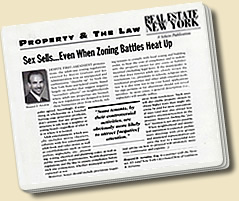SEX SELLS... EVEN WHEN ZONING BATTLES HEAT UP
By Howard D. Avrutine - REAL ESTATE NEW YORK, Property & The Law
 Despite First-Amendment protestations, the adult-use zoning regulations enacted by Mayor Giuliani and his Administration won an unexpected and enthusiastic “thumbs up” by both the New York State and federal courts. Based largely on studies that suggest negative "secondary effects" on neighborhoods where adult-use properties are located, the new regulations are designed to force these businesses away from schools, religious facilities, residential areas… and each other.
Despite First-Amendment protestations, the adult-use zoning regulations enacted by Mayor Giuliani and his Administration won an unexpected and enthusiastic “thumbs up” by both the New York State and federal courts. Based largely on studies that suggest negative "secondary effects" on neighborhoods where adult-use properties are located, the new regulations are designed to force these businesses away from schools, religious facilities, residential areas… and each other.
While these types of businesses are among the most likely to draw the attention and ire of communities, they are not the only targets. To this end, my office handled a matter in which a father assembled a batting cage in the backyard for his children and neighborhood kids -- fulfilling his own American "Field of Dreams." Who could find this offensive? The next door neighbors did, that’s who! And the local municipality agreed. Accordingly, if something as wholesome as a baseball batting cage generates problems, don’t assume that any property or structure is safe from a neighbor or zoning board -- regardless of what it is or where it is located.
Adult entertainment, which usually includes movie theaters, cabarets with live entertainment, adult book and video stores as well as establishments such as tattoo parlors, nightclubs, etc., present very profitable business opportunities, and leasing rates can often be significantly higher than those tendered to more traditional commercial or retail tenants. As seen in the “batting cage” example above, there will always be someone who does not approve of someone else’s land use, even when it is relatively benign. But let’s face it -- some tenants, by their controversial activities, are obviously more likely to attract this kind of attention.
There are, however, preventive steps to make any land use less vulnerable to these kinds of attacks. Purported “enforcement” of building codes is often a tool-of-choice in situations where an adult or other use is legal according to local zoning regulations. As such, it’s recommended one review applicable building, zoning electrical, and plumbing codes, as well as public assembly requirements, health-department regulations and the like to ensure compliance before such use commences, whether municipal scrutiny is expected or not.
Moreover, leases should include provisions requiring tenants to comply with local zoning and building codes, to bear the cost of compliance and to indemnify the property owner for any costs or liability incurred (including legal fees). If the municipality is one that does restrict adult use, closely review the restrictions, i.e., proximity to schools, religious sites, residential properties and other adult-oriented facilities. It is also wise not to tip your hand; applications for sign permits or for alterations should not reveal specifics. In most cases, a general description (i.e., nightclub) will usually suffice.
Constant monitoring of zoning changes is also vital. Even minor changes could have great impact. Sometimes changes are made in direct response to a prospective new user, and can have a significant impact on whether or not a deal will go forward. Again, a kneejerk negative reaction isn’t always the best response -- especially when the deal is economically sound.
Ideally, controversial users should be placed in single-user buildings and/or commercial/industrial areas, away from residences. Such uses will also enable property owners to obtain higher rents than might otherwise be paid for more conventional uses (and may also attract less negative attention/reaction in the process). However, finding the “perfect” location is not always possible.
When neighborhood and municipal opposition is expected, preliminary meetings with civic groups and municipal representatives can pave the way to a successful resolution. Obtaining the support of the local chamber of commerce, if possible, can also be helpful. Approval of controversial-but-profitable projects can also be assisted by adopting a ”good corporate citizen” strategy. For instance, offering to renovate local park facilities, participation in local charitable undertakings, educational and civic causes, etc., can demonstrate to suspicious opponents that the developer is not lining up only to turn a profit but also to give something back to the community.
In summation, don’t be intimidated into ignoring otherwise-profitable business deals. Where a good (but controversial) proposal is presented, bringing good zoning and land-use counsel into the process early to assess the legal impacts, coordinate strategy and advise on how to proceed will ultimately minimize controversy and expense.
By Howard D. Avrutine - REAL ESTATE NEW YORK, Property & The Law
